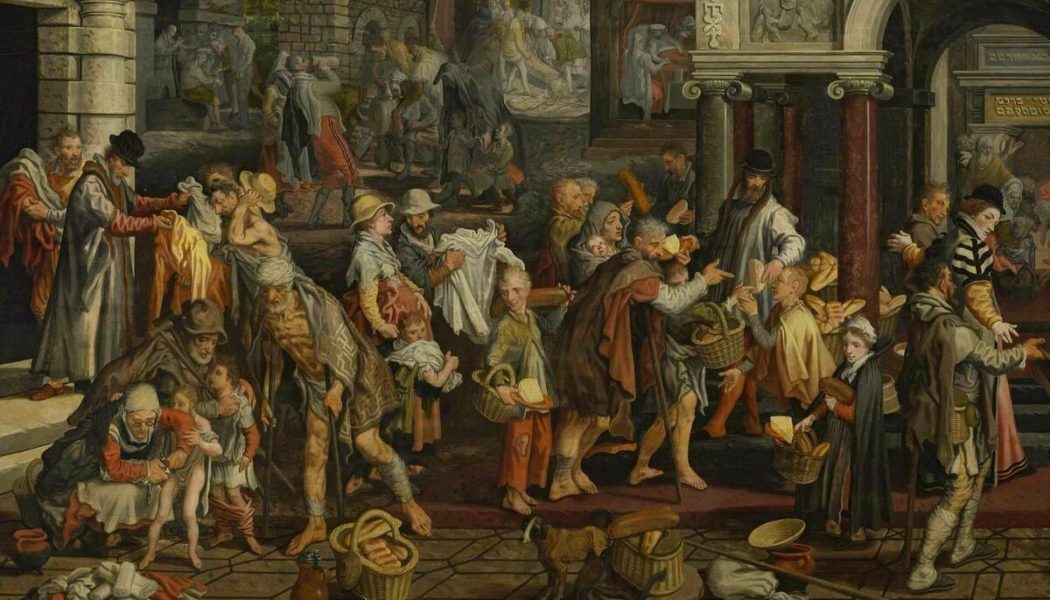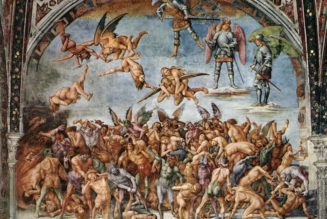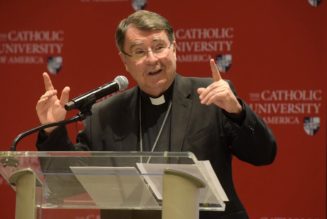
By now the Catholic Church’s support of a “living wage” (along with the related but differing “just wage”) is well known. Magisterial social teaching, along with the documents of synods and bishops’ conferences, since the promulgation of Leo XIII’s Rerum Novarum has consistently upheld his declaration that one “has a natural right to procure what is required in order to live” (Rerum Novarum §44). In the United States, the position of the Committee on Domestic Justice and Human Development is emblematic in its advocacy for just wages and dignified work for all capable of working. Despite this consistency in Church teaching aimed primarily ad extra, which is to say at non-ecclesial ownership, management, and labor, little attention has been given to the need for just wages for the Church’s own employees.
The issue is not merely a theoretical one for me. I have been a teacher at a diocesan high school and a campus minister on several college campuses. I have experienced what it is like to saddle a $50,000 college debt for a master’s degree in theology only to make less than $25,000 at a diocesan job. Now, as a theology professor at a private Catholic institution that is well respected in our local community, I am sending graduates out to our local and regional dioceses to serve in their chancery offices, schools, and parishes. Students are confronted with the dispiriting reality that working for the Church typically means needing two incomes to support a family (Lord have mercy on those Church employees who dare marry another Church employee), having health benefits designed solely for a single person, and, as scandalous as it may be post-Dobbs, rarely having paid maternity or paternity leave.
They do not walk into this blindly. I have made it a tradition in my evangelization and catechesis class to give them “the talk”—a sobering lecture that explains the current state of compensation for Church employees. This includes the fact that, according to a study done six years ago, full-time youth ministers (mind you, in our diocese of Baton Rouge, full-time positions tend to be found only in our few wealthiest parishes) make, on average, $38,586 and part-time ministers $14,324.[1] In our diocese in 2024, monthly health insurance premiums for a married employee and her family cost $1,389.85 per month.[2] The $16,678.20 spent on those premiums yields a more realistic yearly income of $21,908, obviously well below most measures of a living wage, even for one person. Our diocese, like the majority of those in the U.S., does not offer fully paid parental leave.[3]
I raise these facts and figures not to cast aspersions on the bishops, finance officers, accountants, and pastors responsible for such wages and benefits here and elsewhere. In fact, in Baton Rouge, I know most of the responsible parties and find them to be people of goodwill, many of whom recognize the injustice. I assume that they want to rectify the situation and have taken some actions to do so. At the same time, matters of justice, especially when they concern the basic needs of human life, are not insignificant. As the father of a family, I recognize that failing to meet fundamental needs in our (admittedly much smaller) household budget is a serious matter, and when done in full knowledge and freedom, despite the ability to do otherwise, such actions or omissions can constitute grave trespasses of the commandment to love your neighbor. Thus, in the following, I offer a few points to help clarify the Church’s teaching of living wages, contrast an ecclesial view of the economy with the reigning “orthodox” view, and make modest suggestions for the implementation of the Church’s doctrine. I want to stress that I accuse no particular diocese or person of ignorance or ill will. Yet, the Church’s social teaching is hard to swallow and often challenging to heed, even for one like myself who teaches it to others for a living.
What Is a Living Wage and Who Should Receive It?
A living wage, as I use the term here, refers to wages and benefits paid by an employer that enable employees to meet all essential needs for themselves and their families. A living wage is, thus, one form of a “just wage.” The difference lies in the fact that just remuneration does not always demand a wage and benefits that would care for a family or even for all that is requisite for a single person. Very few, for instance, would expect the high school student who signs up to be a lifeguard at the pool over summer to be given a living wage, but most would expect the wage to be just, which is to say, appropriate for the person and the work required. But for those who work a considerable number of hours such that employment occupies a substantial portion of their time and energy, what we normally call “full-time,” a living wage is, in the Church’s view, mandatory.
Such a wage must provide essential needs, with “essential” not meaning “bare sustenance” but, as Pope Francis explains, an amount that affords “general temporal welfare and prosperity” (Evangelii Gaudium §192). Certainly, what one needs to “be well” and “prosper” can have a strong subjective element—when we think about being financially secure, we are often influenced by our upbringing and social expectations. Likewise, our perception of what “living well” looks like can be affected by the country, region, or city (even city street) in which we grew up. Yet, while a living wage may differ according to some of these circumstances, we should not think of it as something entirely subjective. In the Church’s view, such a wage must objectively help workers and their families secure daily sustenance (Rerum Novarum §13) and own private property, especially a home, to provide stability for family life (Quadragesimo Anno §61). It should provide enough for adequate education and healthcare (Evangelii Gaudium §92). It should be sufficient for only one wage earner to take care of the family’s needs instead of requiring a two-income household, and it should include enough provision for an employee to build an inheritance that can be passed on to one’s kin (Laborem Exercens §19).
Beyond these measures, a living wage must allow a worker the means to cultivate a family’s “material, social, cultural, and spiritual life” (Gaudium et Spes §67, Catechism of the Catholic Church §2434). In this sense one can speak of such compensation as sufficient to help a family flourish on all levels of an integrated human life. In the Christian vision, flourishing involves times of festivity and those of fasting; it does not lack means for but manifests physical, psychological, and spiritual health; it accepts and appreciates created goods precisely as goods but rejects the vice of luxury; it is personally enlivening while necessitating community. One might object that this vision, which extends beyond monetarily quantifiable elements, is too lofty and incalculable to be of any real use. But Christianity has never yielded to such a charge when thinking of holiness and virtue. The virtuous life is hard to quantify, but this does not mean that it is merely subjective. And a flourishing life is concomitant with a virtuous life.
So far we have considered a living wage from the vantage of the employee. While the Church’s modern social teaching historically emerged with a concern for the plight of workers, its development rightly integrates this concern within the context of the good of the business as well as the common good of the community. Thus, justice demands fair wages but also an account of the “financial state of the business” (Mater et Magistra §33) and the contributions each worker makes to it (§71). Furthermore, an employer’s determination of wages should include the following: the repercussions on overall employment in a community, maintaining “equilibrium between wages and prices,” making goods and services available to the largest number of people, elimination of inequalities among branches of the economy, balancing expansion with the development of social services, and ensuring “a more human way of life” is available to future generations (§§78–79).
These considerations, along with the good of the worker, in theory fit together seamlessly in the Church’s vision of the common good. Yet, in the “real world” that is marred by sin and its growth into unjust social structures, it is often difficult to establish harmony among so many important elements, and far too often the good of the worker and that of the company are viewed as opposing sides. This is seen every time an argument for raising the minimum wage leads to bickering over whether such a move would shutter the doors of businesses that would supposedly cease to make a profit, or when people decry the treatment of international factory workers as American companies that outsource the manufacturing to such factories stand aloof and largely unfazed. This is not to deny there are complicated arguments to be had on all sides of such matters, but one observation of the informed Catholic should be clear—layers of structural sin can be built upon other layers, making the common good a difficult one to be had. At minimum in a given business, even a parochial one, employees should be working with excellence, and management should aim to pay all employees a living wage rather than to merely maximize profits. So, too, should management never consider a signed contract as evidence of justice toward workers. “Agreement between parties is not sufficient to justify morally the amount to be received in wages,” the Catechism warns (§2434), and commutative justice—that between two parties—is always to be integrated into distributive justice, which is to say, what society owes to all persons and their families (Caritas in Veritate §35).
Mainstream Economics vs. an Ecclesio-Communal Vision
Is the Church’s vision of wages in step with that of most economists? Does it coincide with the conception of the economy that filters down into secondary and higher education, the people formed there, and the economic models that inform modern business practices? The Church’s teaching, I contend, is divergent in certain essential ways from the economic orthodoxy of the culture in which most of us have been formed. “Formed,” here, is an important word, because our economic choices are often shaped by cultural forces. So, too, are the Church’s social doctrines not merely facts to be memorized but lights on the path of holiness. Morality is much more than a matter of knowing certain things. The Christian life is a matter of grace, the transformation of vision, and the grace-filled practices of following the illuminated way. What I am suggesting is that the ability to follow the Church’s teaching on wages, whether one is an employer or the employed, may require nothing short of a conversion of worldviews and the practices of which such worldviews are formative.
Mary Hirschfeld’s Aquinas and the Market provides an eye-opening account of the overlap and differences between mainstream economics and what I will call an ecclesio-communal vision of the economy. Hirschfeld, a Harvard-trained economist and Notre Dame-trained theologian, is certainly well qualified to speak on the matter, and while I was familiar with much of Aquinas’ thought as presented in the book, it was the all-encompassing claims of modern economics that caught me by surprise. The claims were of the sort that I would expect to hear from natural scientists—namely, that human behavior can be described and predicted with mathematical accuracy through models with the correct function. In the case of economics, our choices can be determined through a model with a utility function that correctly represents our subjective preferences of one good or service over another or one bundle of goods and services over another.[4] Such models can even take into consideration the altruistic person, since giving, on this count, can contribute to one’s subjective utility. A well-constructed model can, thus, become a foundational determinant of production and consumption and supply and demand. In short, the human being is homo economicus and economics is the new physics.
Hirschfeld warns that the economic layperson’s typical objections to this vision of practical reason often fall short, but she does offer several of her own fundamental critiques, one of which I take up here: a critique of the orthodox economic assumption that “individuals have unbounded desires.”[5] The claim undergirds the unspoken premises that economic growth is always preferable, that profits should always increase, and that more is always better.
For example, in a popular textbook recently used in my institution’s macroeconomics course, William McEahern begins with a claim that is standard to the genre: “The problem is that although your wants, or desires, are virtually unlimited, the resources available to satisfy these wants are scarce.”[6] Unlimited wants and the scarcity of things to fulfill them places human beings on an unending quest to obtain the right combination of goods that maximizes the value of those goods in comparison with other combinations. The infinitude of human desire, at least in this vision, is the engine that drives the economy in its numerous considerations of human behavior and choices, its weighing of marginal benefits and costs, determining production and supply to meet demand, and increasing or decreasing regulation. Homo economicus is a creature whose need for consumable goods is insatiable, and the obstacles that obstruct his quest for ever-increasing satiety are limited resources to supply and purchase them.
This typically modern vision, however, is not the only way to conceive of humans and the economy. David Cloutier, for instance, draws our attention to the classical notion of the polis, in which the telos of the person is a good life that does not require unlimited material goods and in which the common life of the city becomes the context by which any individual good can be directed to its proper end.[7] Thus, in the Republic, Socrates and Glaucon imagine creating a city, an endeavor that accords with the fact that “no one is self-sufficing,” in which different persons hold diverse roles and trades and their mutual exchange of goods allows for the provision of everyone’s needs. Socrates envisions that a flourishing life in this city is not simply meager—the people enjoy cakes and loaves served on reed mats while they recline upon rugs of myrtle. They and their children “feast, drinking of the wine which they have made, wearing garlands on their heads, and hymning the praises of the gods, in happy converse with one another.”[8] Glaucon, however, worries that such meals need “relish” and that even such moderate living is the life of “beasts.” Human living, in his view, requires fineries such as sofas and tables, sauces and sweets, an excess that Socrates calls “luxury.”[9] A city of people who “require” more than what is necessary for human flourishing leads, Socrates suggests, to the production of more goods, which requires more land and resources, ultimately leading to war and conquest. Thus, the addition of luxury is, the dialogue advises, a possible first step on the path from common life to a fractured existence dominated by the lust for power and wealth.
Apart from some of the upper crust of American socioeconomic technocracy, most, I imagine, can find resonances of the truth of Socrates’ warning in our modern life. That luxury seems not excessive but essential reverberates in our culture, attempting to convince us of a supposed indeterminable need for more. Still, on occasion, the vision skews, revealing its inability to be a perfect fit with the human heart. This is especially true whenever we are confronted with injustice, whether the injustice is our employer’s or our own. In my profession, the excessive use of adjuncts is a symptom of viewing humanity as homo economicus, and in ecclesial ministry, the low salary and high turnover rate of youth ministers is indicative of the same. Likewise, the temptation to upgrade my mobile device every year and the presence of long-unworn clothes in my closet are emblematic of my own “baptism” into such a worldview.
Thankfully, the Church’s tradition—if not her everyday practice—offers a counter vision, one that is found not only in her modern social teaching but in the extensive theological tradition that precedes it. Creation, the Hebrew Scriptures make clear, is a gift humanity must till and keep (Gen 2:15). The fruits of the earth are meant to sustain all people, especially orphans, widows, foreigners, and others in poverty (Dt 24:17–22, Lv 19:9–10). In the New Testament, Jesus calls the man who saves excess grain a fool and warns that the good life does not consist in an abundance of possessions (Lk 12:13–21). While being rich is never directly condemned by the New Testament, and certain Christians like Lydia had abundant means (see Acts 16:14), Jesus makes it clear that wealth is a challenge to entering the kingdom of God (Lk 18:25). The apostolic church, in the first Christian community at Jerusalem, manifests the biblical tradition by selling their possessions and distributing the proceeds to all in need (Acts 2:44–45 and 4:34–35). These Scriptural witnesses and others teach that wealth is meant to serve the needs of people through the just distribution of created goods so that all can live a life of love of God and neighbor.
This vision of God’s universal providence and intimate love of the poor was inherited by the centuries to follow. The Fathers’ exhortation to just distribution is manifold. St. Anselm chastises those who affront what we now call the universal destination of goods:
You believe that whatever belongs to anyone else is your loss. Why does harm done to nature give you pleasure? The world was created for all, but you few rich try to keep it for yourselves. For not merely landed property but the heavens themselves, the air, the sea are claimed for the use of a few wealthy persons. This air, which you include in your widespread possessions, how many people can it provide for! Do the angels have portions allotted in the heavens to correspond with the divisions that you make on earth?[10]
This claim that created goods are meant for the life of the entire community is held so strongly by the Fathers that failing to distribute them is seen as stealing. For St. John Chrysostom, “Not to enable the poor to share in our goods is to steal from them and deprive them of life. The goods we possess are not ours, but theirs.”[11] St. Augustine explains further:
Ask yourself how much [God] has given you and then pick out what you need; all the rest of your things lie there as superfluities, but for other people they are necessities. The superfluity of the rich is necessary to the poor. If you hold onto superfluous items, then, you are keeping what belongs to someone else.[12]
That the Fathers so adamantly held to this ecclesio-communal vision shows that their words are not exhortations to charity; they are demands of justice. In the Middle Ages, St. Thomas Aquinas, with his characteristic rigor, receives the same vision. Recognizing that the natural law holds that created goods are meant to be common to all, Aquinas explains that individuals can still possess some created goods as their own because this is how positive law allows for just distribution to everyone (ST II-II, q. 66, a. 2). However, even this private ownership exists, the Angelic Doctor explains, for the use of all. We own things precisely so that we might help ourselves, our families, and our community flourish. A person who acquires more than what is necessary sins if he intends it only for himself or an unreasonably small number of people; he does not sin if his intent is to share it with the community. This communal vision is so strong that Aquinas notes that someone in desperate need could lawfully take, in a “secret or flagrant” manner, from one who had superfluous goods, and “in such a case there is strictly speaking no theft or robbery” (ST II-II, q. 66, a. 7).
We may seem far removed from the matter at hand, but let us draw some conclusions that summarize the differences between what I have called the ecclesio-communal vision of economics and today’s dominant economic paradigm. For homo economicus, because the infinitude of insatiety is the engine of the economy, more utility is always better. And since the common measure of utility in our world is money, this most often translates to, for the business, the unending drive for increased profits and, for the individual, the unceasing need for more money to purchase more consumable goods and services. A well-meaning business, in this paradigm, will always feel the temptation to cut costs and grow wider margins, even at the risk of injustice. Its employees become commodities, or human “resources,” retained or dismissed according to the all-encompassing utility function. They are paid to the extent that they maximize the business’ margins.
The employee faces her own temptations. Saddled with fluctuating costs that eventually rise over the long term, she perceives that she must both acquire more and save more. That she calculates her utility by way of the necessary abstraction of money makes it harder for her to think of the real goods necessary for a flourishing life. And even when she makes choices concerning these goods, she is constrained to think of them as “trade-offs”—to select one bundle of goods and services is to forsake other bundles. As the amount of utility rises and falls depending on the values of goods and services and how much homo economicus already has of them or perceives she needs of them, she continues to choose in hope of more utility. There is no foreseeable end to this drive—when the “goal” is an infinite utility vector, there can actually never be a “goal” besides more everything, especially more money to acquire that “everything.”
By contrast, in the ecclesio-communal vision, there can be enough. Instead of an infinite vector of utility, the goal of the economy is a flourishing community, a way of life that is diminished by both stinginess and luxury. Income facilitates this flourishing by being a means to acquire real goods that help real people live virtuous lives. The business should aim at distributing its profits for the good of its employees and those the business serves through its goods and services. The employee, seeking the good of the entire company and the community in which it is situated, should work industriously, putting forth virtuous effort to cultivate the created world for the betterment of the community, including himself. His work thus produces something he is proud of, because it makes a genuine contribution, no matter how small, to communal life. In return for this hard work, he rightly expects his employer to pay a living wage as a just distribution of the company’s earnings. Upper administrative employees, justly paid in higher amounts (at least, in principle) for their servant leadership and more complicated work, should not receive superfluous salaries when other employees are being paid below a living standard but should desire to make sure the entire community’s good is upheld. All employees should envision the goods they acquire via their well-earned salaries as goods meant to be used for the flourishing of the community, including themselves. When they choose such goods or bundles of them, they do not perceive such a choice as the mere maximization of utility but as the selection of what is most fitting for a virtuous life.[13]
Big Steps, Small Steps, and Transcendent Steps
The foregoing discussion is but a small taste of the differing worldviews encountered in the Church’s doctrine and modern economic orthodoxy. To be culturally formed in the latter, as many of us have been, inevitably makes it difficult to understand the former, or—even should one conceptually understand it—to see it as a viable option. It can seem as unrealistic as other possible but unlikely cultural changes, like deciding to leave one’s homeland for a starkly different foreign country or leaving a long-held occupation with its own vocabulary, habits, and technical know-how to take on a new career in an entirely dissimilar sector. It is one thing to see how the worldviews differ, but another to leave one to willingly inhabit the other. Here, I can only acknowledge the difficulty while recognizing that such a worldview change is facilitated by the grace of Jesus Christ, the one who is the living center from which grows all the Church’s doctrine. In this sense, to embrace the Church’s social doctrine more fully can actually be a work of conversion.
What practical steps can one seeking to make such a change take? I offer the following possibilities, culled from my own research of practices undertaken by dioceses and parishes and through conversations with business owners and pastors who have made attempts to shift away from “business as usual.”
Mission
It may seem impractical to begin with an organization’s mission, for what could mission possibly have to do with finances? A study on Catholic giving by Notre Dame’s McGrath Institute found that the single most important factor explaining why Catholics did or did not give to their parishes—which is the parish’s primary source of income—is whether they were “spiritually engaged” with money, which is to say, whether they considered giving a part of their Christian formation and spiritual life.[14] For many Catholics, money and possessions have no connection to the Christian life. Compartmentalization is the norm. Parishes that approach giving with a “pay the bills” mentality unwittingly further this fragmented vision. On the other hand, parish cultures that focus on “spiritual growth and personal and world transformation,” that engage parishioners with the Church’s mission and help them to see how giving participates in this mission, experience greater amounts of giving. The same presumably holds for other Catholic institutions.
Vision-casting, of course, is one thing, but putting a mission into practice is another. To do this, institutions should hire and form people who will unmistakably accomplish the mission. Not only those responsible for liturgy or catechesis but administrative assistants, maintenance workers, and accountants should all be people who embrace and see their work as a participation in the Church’s mission. In appropriate positions, those hired should be mentored and trained to take on greater responsibilities, which will only further industriousness, ownership, and pride in the work they do. Likewise, their greater accomplishments will justly earn greater pay. When parishioners are given a transparent look into this and are offered a chance to be a part of it through their own efforts and donations, their contributions, spiritual and financial, will end up being more than “business as usual.”
Certainly, undertakings of this magnitude can seem burdensome or nearly impossible for a Church that, as pastoral workers often joke, moves at a glacial pace. Yet Pope Francis, from the beginning of his pontificate, has exhorted the Church to cast off a mentality of maintaining the status quo, that says, “We have always done it this way.”[15] Even faced with initially meager resources, a Catholic institution should be like St. Joseph when confronted with the prospect of Mary giving birth to the Son of God in a stable. His “creative courage,” Francis tells us, transformed the stable into a source of divine providence for the world.[16] Dioceses might take inspiration from the Diocese of Wichita, which over thirty years ago began a creatively courageous program that has allowed students to attend Catholic school tuition-free while simultaneously bolstering parish participation. Families register at a parish, pledging to go to Mass every Sunday and participate in the life of the community. They are asked to give eight percent of their income to the parish and two percent to other charities, with an understanding that those who cannot afford it can offer what is possible in hopes of eventually meeting the goal. Those with more means contribute to a scholarship that funds lower income families. Endeavors like this prove that the risk of moving from maintenance to mission can be well worth it.
Compensation
As we have seen, the Church teaches it is a matter of justice that full-time employees are paid a living wage. Those in leadership at Church institutions should aim to provide this with the joy of doing God’s will rather than by taking on part-time employees and having them work only enough hours to avoid the requirement. Mainstream economic culture can subconsciously convince us that the goal is simply to save as much money as possible, blinding us to the truth that money is meant to acquire real goods to help people live virtuous, flourishing lives.
Instead of making offers through mere conversation, leaders should provide employees with a contract that makes clear both the mission-driven duties expected and the just compensation offered. Without this, employees are susceptible to being promised one thing by someone like a pastor, only to find a business manager offering something else. It can be disheartening and frustrating to hear such a person claim, “I never heard about that conversation.”
Compensation should include both salary and benefits. Those who genuinely cannot afford to offer a living wage should immediately begin working on creatively courageous ways to do so, while at minimum paying the market average, such that the employee makes more than 50% of others in the same position. Yearly cost of living increases should be the norm and not the exception.
One difficulty in offering just compensation as the Church desires is surely governmental laws that require “equal pay for equal work.” The Church’s doctrine, on the other hand, takes into consideration people in their individual circumstances—for example, how many children a person has and whether a spouse desires to work full-time. Employers, by law, are often prevented from asking about such pertinent circumstances. Still, when such situations are known by legal means, a small step in the right direction would be to adjust pay according to the admittedly limited range of parochial pay scales. Those who need most help should be paid at the higher end of the allotted range. Beyond this, institutions can make up the difference through benefits. Certainly unconventional in ecclesial settings, the employee’s portion of health insurance premiums could be the same for a single employee and for one with a family. If this is not currently feasible, then the premiums for a family should at least be affordable in a way that accords with a living wage. Other benefits, such as housing and education, can be creatively drawn upon with help from the local community to ensure justice is met.
Paid parental leave for the addition of children, whether through birth, adoption, or fostering, should be normative in Catholic institutions. It makes no sense for a Church that so adamantly fights for prenatal justice to not offer paid time-off for women and men who welcome a new child into their midst. Fellow employees, because they too recognize the importance of the mission, should, so long as it can be done justly, be willing to help cover the duties of those who need this time with their families. Even in situations where the paid leave must be less than fully just, a small step in the right direction would be to allow fellow employees to gift their paid vacation, sick, or time-off days to one needing leave.
Oversight
Diocesan, parish, and institutional finance councils and committees should consider themselves guardians and promoters of the Church’s economic teachings in their respective communities. Members should be those who understand the Church’s teachings, have an inclination to fight for justice, and whose spiritual lives manifest in charity to the poor. Integrated into the institutional mission, they should be given opportunities to teach how money and material goods play a significant role in the Christian life and are at the service of the love of God and neighbor. Institutional finances and spending should be transparent so that management, employees, and those served can see how resources and money are being justly and wisely employed to accomplish the mission. A tendency to secrecy in such matters or a feeling of shame in being transparent can be strong indicators of present injustice. Committees and councils should make correcting injustices a regular agenda item and be willing to contact other dioceses, parishes, and institutions to see how they have done better.
These recommendations are but a few of the many the Church can consider in the goal of following its own doctrine. In Economic Justice for All, the U.S. Bishops, in what is one of the few documents that even addresses what the Church owes to its own employees, remind us that “all the moral principles that govern the just operation of any economic endeavor apply to the Church and its agencies and institutions; indeed the Church should be exemplary” (§347). We cannot give what we do not have. The Church cannot make disciples without first being disciples of the Lord and his doctrine. To follow this teaching, especially if it is difficult to do so, is a work of nothing less than conversion that moves us into deeper union with God. The paths to such union are many, but—to return to the Fathers as a conclusion—Augustine helpfully categorizes them into three. Some have won the crown of martyrdom. Others have taken up the counsels, selling all they have to live in poverty. Finally, there are those who took the third way, that allowed them to stand at the Lord’s right hand: these “fed the hungry Christ, gave him drink in his thirst, clothed him when he was naked, and welcomed him when he was traveling.”[17] The Church would do well to remember that the poor Christ is found not only outside her walls but, often, in her own offices, classrooms, and hallways.
[1] See Charlotte McCorquodale, Passing of the Baton in Catholic Youth Ministry: A National Longitudinal Research Study of Catholic Youth Ministry Leaders (Washington, D.C.: National Federation for Catholic Youth Ministry, and Metarie, LA: Ministry Training Source, 2018).
[2] This is the premium for the “Traditional Plan Preferred.” “Traditional Non-Preferred” is $1,424.85, “HSA Preferred” $887.14,” and “HSA Non-Preferred” $922.14.
[4] Mary L Hirschfeld, Aquinas and the Market: Toward a Human Economy (Cambridge, MA: Harvard University Press, 2018), 39.
[6] William A. McEachern, ECON: Macroeconomics, 4 ed. (Stamford, CT: Cengage, 2015), 4.
[7] David Cloutier, The Vice of Luxury: Economic Excess in a Consumer Age (Washington, DC: Georgetown University Press, 2015), 26.
[8] The Republic, Book II in Plato, The Republic and Other Works, trans. B. Jowett (New York: Anchor Books, 1973), 56.
[10] Anselm, On Naboth 3.11, trans. Boniface Ramsey, OP (New York: Routledge, 1997), 120.
[11] John Chrysostom, Homily De Lazaro 2.5, as found in CCC §2446.
[12] Augustine, “Psalm 147” in Expositions of the Psalms, Vol. 3, trans. Maria Boulding, OSB (Hyde Park, NY: New City Press, 2004), 455.
[13] See Hirschfeld, Aquinas and the Market, 179: “Economic logic sees choice as a matter of trade-offs, whereas prudence sees choice as being more like the artist’s discernment that painting a central figure with a blue robe rather than a red robe better fits the overall meaning and mood of the painting. One could choose to think of the choice to marry one’s spouse as a trade-off against the possibility of having married someone else. But a marriage is more likely to work if one recognizes that one’s spouse is a fitting partner in life.”
[14] Brian Starks and Christian Smith, Unleashing Catholic Generosity: Explaining the Catholic Giving Gap in the United States (University of Notre Dame: McGrath Institute for Church Life’s Catholic Social and Pastoral Research Initiative, 2011), 3.
[15] Pope Francis, Evangelii Gaudium §33.
[17] Augustine, “Letter 157” in The Works of St. Augustine: Letters 156 – 210, Vol. II/3, trans. Roland Teske, SJ (Hyde Park NY: New City Press, 2004), 36–37.









